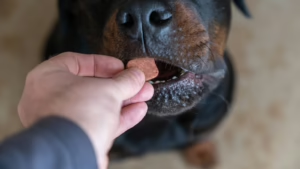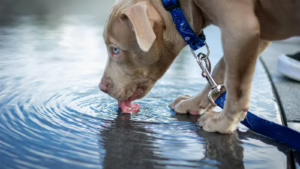Our vets share their tips on how to maximize summer fun while keeping your pet safe, happy and healthy!
Summer is a favorite time of year for so many, including our pets! Their kid-playmates are home, the days are longer, sunnier and include sideline sports-watching, patio happy hours, backyard sprinklers and road trips to the lake or beach. So while we love summer for its many outdoor and social activities, hot weather comes with its own risks to pet safety. Some of these hazards can even prove to be fatal like heatstroke, drowning or hot cars.
Here are some summer tips for pets to help everyone enjoy the season safely!
Preventative Health & Pesky Pests
Don’t let pests and parasites spoil the summer! If you’re overdue for an annual wellness exam, make sure to schedule one with your veterinarian during early-summer. Parasite risks like fleas, ticks and heartworm surge during warm weather and can cause nonstop scratching, allergic reactions or life threatening, infectious diseases. To be cautious, make sure your pet is up to date on all their flea, tick and heartworm prevention medications.
Beat the Heat
Especially in the South, our hot temperatures can get extreme! Temperatures over 70 degrees are often considered the point where overheating becomes more of a risk to dogs and cats.
Pets with shorter noses and flat faces – also known as Brachycephalic breeds like French Bulldogs, Pugs and Persian cats – are less adaptable to hot temperatures and more susceptible to heat stroke since they cannot pant as effectively. The same goes for young puppies, senior dogs, overweight pets or those with other heart or lung problems.
During extreme heat or high humidity, avoid strenuous exercise, keep your pet indoors and stay ahead of dehydration with fresh water always on hand. Due to hot temperatures and high humidity, a fatal heat stroke isn’t uncommon, and entirely preventable. Signs of heatstroke or heat exhaustion to be aware of include:
- Heavy drooling
- Excessive panting
- Difficulty breathing
- Rapid heartbeat
- Dry or red gums
- Difficulty walking or collapse
- Vomiting or diarrhea (may be bloody)
If you think your pet is experiencing a heat stroke, bring them to a cooler area immediately and cool your pet down with fresh, cool (NOT cold) water. As a next step, contact your veterinarian or closest 24-hour emergency vet right away.
Note: The ReadiVet team does not provide emergency services outside of normal business hours. If you your pet may be experiencing a life-threatening emergency, please contact an emergency care facility near you.
Protect Their Paws
Be aware of hot pavement! Streets, sidewalks and especially asphalt heat up to extreme temperatures during long, sunny days. Don’t risk painful burns on your dog’s paw pads and be mindful of the 7-Second Rule. Place the back of your hand on the ground surface for seven seconds and if it’s too hot for your hand, it’s too hot to walk your hound. It helps to walk during early morning or evening hours when it’s cooler, or hike with your dog down grassy paths or covered trails.
Say “No” to Hot, Parked Cars
Never ever leave your pet in a hot car — even parking in a shaded area with the windows cracked open isn’t safe. The temperature can rise 20 degrees within only 10 minutes and continues to climb as time goes on. This means a car can get dangerously hot in a very short time and can trigger a fatal heat stroke – so it’s never worth the risk!
Lifeguarding For Your Pet
Just like with kids – it’s important to take precautions for dogs around open bodies of water. Here’s some swimming safety tips for dogs:
- Never leave a dog unattended in or near open water. Even the best doggy paddlers can suddenly get tired, caught in a current or need help getting out of a pool — any of which can put them at risk of drowning.
- Be honest about assessing your dog’s ability to swim and affinity for water – not all dogs are natural swimmers, and you should never force them to be.
- Consider a canine life vest when boating or you’re unable to keep a close eye on your dog around water.
- Avoid letting your dog drink too much salt water or chlorinated water, both of which can make them sick. Ensure there is always fresh water available for them to drink and remember to rinse off their fur after swimming.
Not All Greens Are Good
For pet parents with a green thumb, being aware of potential risks in your backyard or garden is the best way to enjoy the outdoors with your pet’s safety in mind.
- Use caution when using herbicides or insecticides, as fertilizer exposures are more common in the summer and can become more serious than just an upset stomach.
- Be mindful of what plants are toxic and which ones are safe for your pets. As a resource, read our past blogs to familiarize yourself with toxic plants and avoid unwanted exposures.
- Additionally, keep citronella candles, tiki torch products, firewood, and pool chemicals out of reach from pets.
While summer does carry some risks, there’s no need to be timid or avoid fun times with your pets! Knowledge, preparedness and using your best judgement will help maximize your summer fun while keeping your pet safe, happy and healthy!




